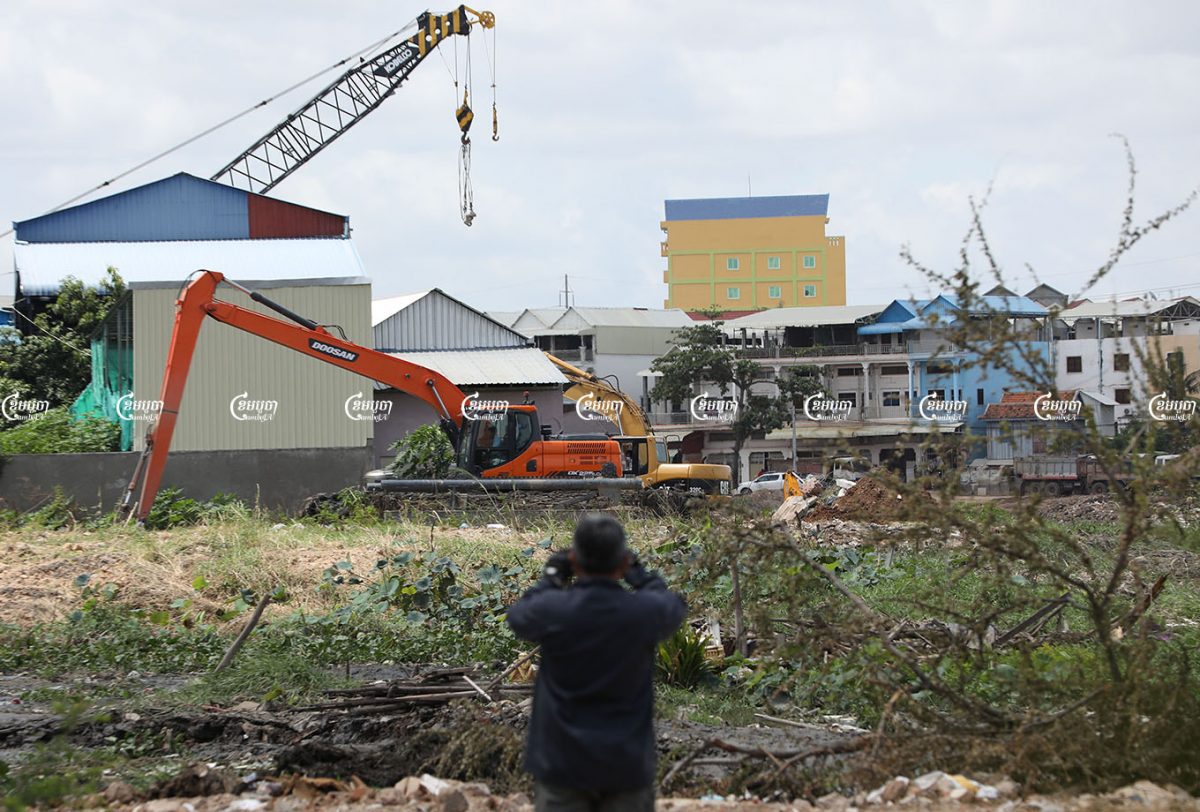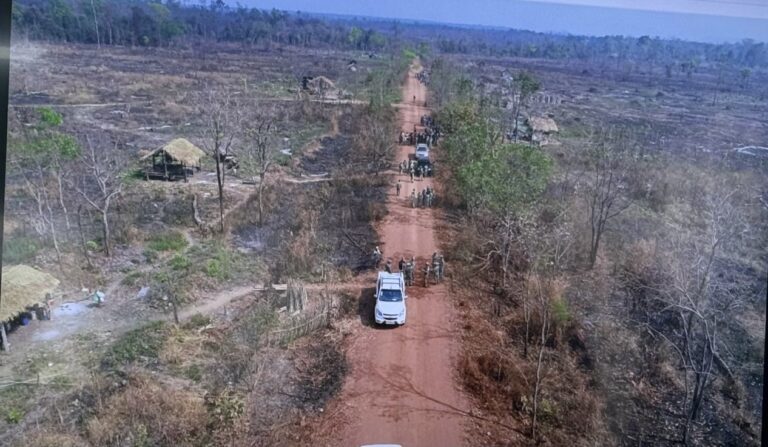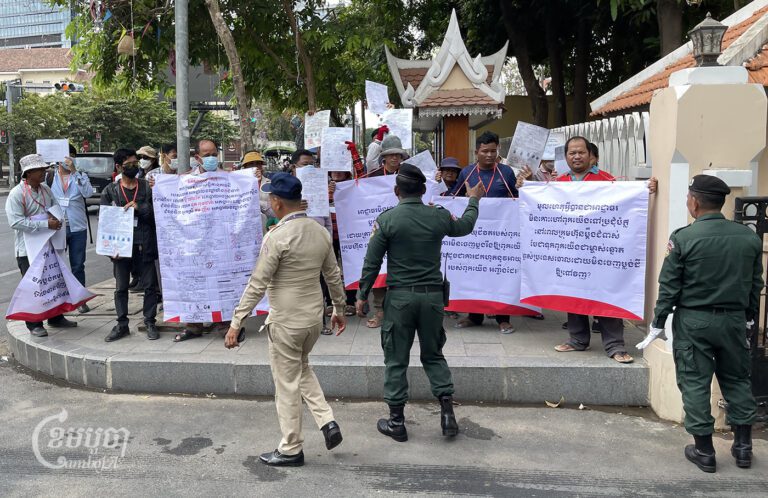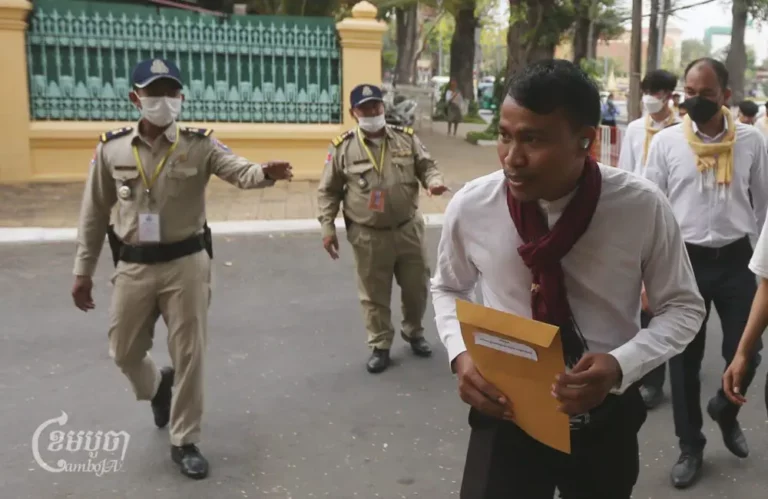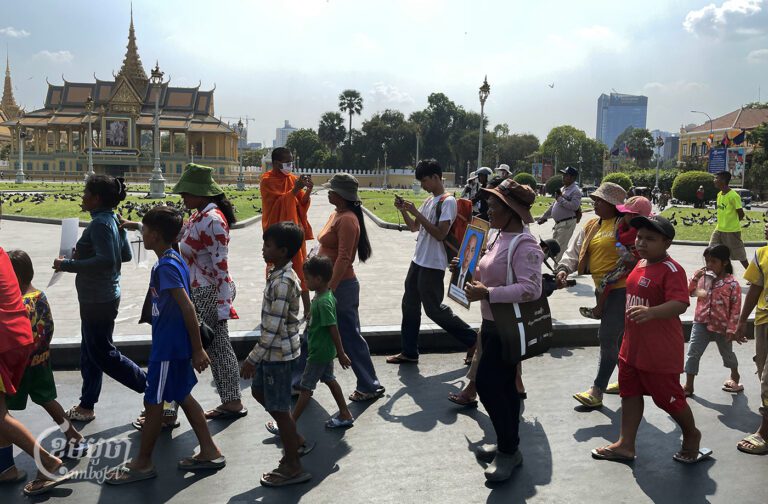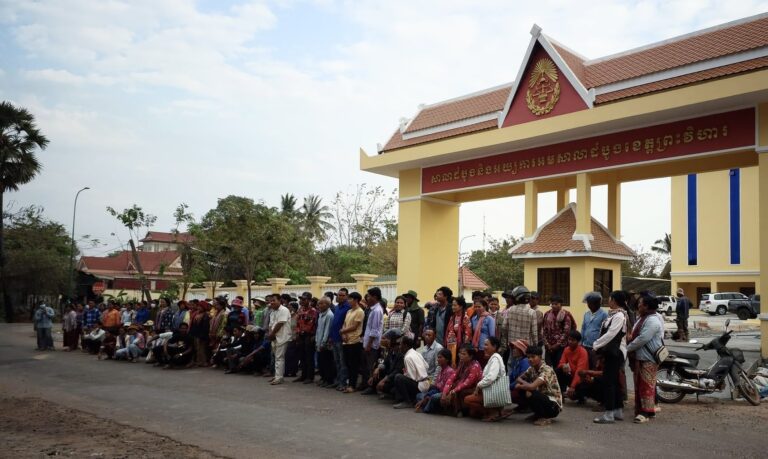Two journalists were stopped and harassed by Phnom Penh police and security agents on Friday while covering a land dispute between authorities and residents along Boeng Tompun lake.
That same day, dozens of Meanchey district authorities used bulldozers and other heavy machinery to clear the homes of about 11 families along the reservoir in the city’s Boeng Tompun 1 commune, one week after ordering the homes be dismantled to make way for a private development. Government officials say the southern Phnom Penh lake is state-owned, but the body of water has become a development hotspot due to large-scale infilling and leasing to outside firms.
An Vichet, a freelance journalist working with CamboJA who was covering the home demolitions, said police confiscated his smartphone and press card and ordered him to delete all images he’d taken of the site.
“I was asked to show a press card and delete all photos,” he said. “They took my press card away and asked me to leave the place immediately or there would be a problem, saying this is their area, so no photography was allowed.”
Vichet said the encounter was a serious violation of press freedom and a restriction on journalists’ work.
“This activity of authorities is not hidden, it is in public, so journalists just have the role to capture the images and disseminate information to the public,” he said.
VOA Khmer reporter Lors Liblib, who also covered the dispute, said about 50 authorities took part in demolishing people’s homes.
“I was taking pictures when people were angry with the authorities,” he said. “Then [police] pointed at me, ordered for me to be arrested and my cell phone confiscated, and deleted all the pictures.”
Liblib said then authorities ordered him to leave the place, otherwise they will take other legal action.
“For me, I think this is a threat to the freedom of the press and they may want to hide this from the public,” he said.
The Cambodian Journalists Alliance Association (CamboJA) denounces the Meanchey district police and security agents for confiscating the identification cards of the reporters and calls on authorities to immediately stop such violations.
CamboJA executive director Nop Vy said in a statement that “the use of any forms of restrictions is a violation of the press law and the Constitution — that is unacceptable”.
“We call on the authorities to immediately stop the acts of harassment, intimidation and threats against journalists, and instead cooperate and pay respect to the role of journalists in order to prove that the government truly pays attention to and respects the rights of citizens, especially the right to information,” he said.
However, Phnom Penh deputy Governor Keut Chhe said the authorities’ actions against the reporters had been legally permitted.
“If we look at the instructions of the Ministry of Information, in the operation locations of authorities, journalists do not have immunity to enter the location,” he said. “Professional journalists must follow the instructions and the law, because it does not mean journalists have the right to access during the operation. It is understandable that the authorities have just deleted the image.”
Families affected by the reservoir project
Friday’s conflict played out in a similar fashion to many land disputes in the capital, where space is at a premium and new construction a booming business.
On February 20, 2018, the Council of Ministers issued a decision to provide 35 hectares of Boeng Tompun to a private company, reportedly Phnom Penh Precast Plants, to prepare the area for commercial and residential development. The company also said it would provide green space and restore the reservoir, which is dwindling in size as developers fill it with sand and earth.
Some residents say they have lived there for more than 30 years with recognition from local authorities.
Sou Chetra, 42, told CamboJA he has lived there since 1991 and that the authorities destroyed people’s houses without providing them with compensation.
“We have sent papers to the commune, district and cadastral department but have received no response. I am so hopeless now,” he said. “Please give us our land and our home, don’t hurt us. Authorities don’t need to feed us, we can live our way, just give us back [our property].”
Sari Vannda, 34, who works as a food delivery driver in Phnom Penh, said he did not know why his home was being demolished but that authorities had given him one week to move.
“Authorities just come and destroy our house by showing one paper. It’s our land and houses that we have lived in since our grandmother,” he said. “They want us to move, I don’t know how to deal with it. My family will have no place to live during COVID-19.”
Keut Chhe said after the government gave the private firm the right to develop the land, the company was obligated to offer compensation to affected families. Since the affected land is along the reservoir, authorities say it is state property and do not provide any compensation for lost property. Chhe denied that the affected homes were there for as long as residents said they were.
“The houses near the lake were just built after 2018, while those families will not receive compensation as they live on the state property,” he said. “We need to restore the reservoir to avoid flooding in the city.”
Still, it is believed that past decisions from the government did require the private firm involved in the Friday demolitions to pay compensation to displaced people at a rate set to the square meter of land lost. It’s not clear how or when those payments will be made.
Information Ministry spokesman Meas Sophorn did not comment.
Am Sam Ath, deputy director of the rights group Licadho, said no one rejects infrastructure development under peaceful conditions, but that the impact of projects on citizens must be considered, particularly during the COVID-19 crisis.
“The best choice is peaceful negotiation rather than damage or violence that can affect people,” he said. “To evacuate people is not advantageous based on previous instances, especially during COVID-19. It is a high tragedy for people while they are affected by COVID-19 and then their home is destroyed.”
Sam Ath also said journalists should be allowed to cover without intimidation all public activities by authorities.
“Journalists have the right to report, take photos and video without any barrier,” he said. “[Raising barriers] violates freedom of press and it seriously abuses the rights of journalists.”


